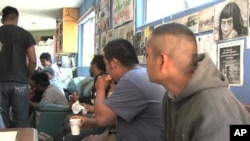The southern U.S. border with Mexico is the focus of political debate over illegal immigration. But human dramas play out every day along the border. In Nogales, Arizona the conflict pits U.S. ranchers and residents against migrants trying to cross the border illegally.
Some property owners in southern Arizona, like Glenn Spencer, look out over Mexico from their back porches. Spencer says he is trying to stop a flood of illegal migrants.
On part of his property is a massive border fence more than five meters high. But it stops abruptly and is replaced by a small vehicle barrier that can easily be crossed by anyone on foot. Spencer gestures to an old barbed wire fence a few meters away.
"That is Mexico right there," he said. "They come right through that hole in the fence. There is no fence. They come across this barrier, right up here. The Border Patrol cameras cannot see us here."
The U.S. Border Patrol often checks this area, including Spencer's property, but he says many border crossers still get through.
Spencer created a private organization called American Border Patrol to monitor the border. He flies over the area in a small private plane. At his home, Spencer displays computer photographs taken along the border.
"It is wide open," he said.
His group has been criticized as racist, but Spencer says this has nothing to do with race, only with border security.
Across the border in Mexico, the quiet town of Naco receives a steady flow of border crossers who have been arrested and deported from the U.S. side.
The Migrant Resource Center is run by American volunteers who hear stories of dangerous crossings. The volunteers offer food and medical help.
Arizona artist Peter Young helps at the center.
"The people we deal with are the people who have tried to cross the border and who have failed," he said.
Young says some crossers make it through the border region after several tries, but others become discouraged and give up.
Some stories end tragically. More than 200 suspected border crossers died last year in the desert near Tucson. Drug cartels control much of the human smuggling and some migrants are victims of violence. A U.S. rancher was also killed this year, and authorities say it probably was the work of a Mexican drug smuggler. Migrant women have been raped, and some have not survived the journey.
In a small apartment in Nogales, Mexico, run by a Catholic charity, a woman named Artemia tells her story. She was abandoned by her smuggler in the desert and now she faces a dilemma.
Artemia says she lived in the U.S. city of Indianapolis, Indiana for seven years. She returned to Mexico after her father died and was arrested twice trying to return with her husband and 19-year-old daughter. She has two American-born sons who are five and seven years old, and who are staying with her sister in the United States. Artemia says the boys might have to join her in Mexico.
She gets help from Catholic priests and nuns who run a charity called the Kino Border Initiative, named after Father Eusebio Kino, an early Spanish missionary in what is now Mexico and Arizona.
Most migrants are from small villages, and Catholic priest Pete Neeley says many are victimized at the border.
"[T]rusting somebody they should not trust and losing their money or losing their identification papers, or whatever they are carrying," he said.
Church members offer food and guidance.
American priest Sean Carroll says border crossers want jobs, and others want to join their families.
"Because they are living in poverty or living in destitution," he said. "They want a better life for their families and/or reunification. They have children; they have spouses; they have parents; they have brothers and sisters in the United States."
To the north, in Arizona, resident Bill Odle wants more border security, but he feels sympathy for the migrants - including a woman that he met on his property.
"She is lost," he said. "Her group left her. She is in a foreign country. Her story is about how bad us gringos are. So it is really heart-wrenching. Real sad."
Those who live and work on the border say the problems are complicated, involving demands for better security and pleas for help from desperate migrants. They say these human stories often are lost behind the policy debates.











